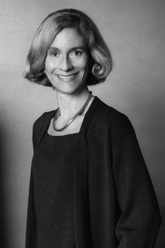What is a good citizen? How does one define quality of life, and for whom? Does American responsibility for political and economic considerations of human rights to life, liberty, and the pursuit of happiness stop at the borders of our own nation? Martha Nussbaum, a philosopher and influential intellectual, considers such topics in the context of classical studies, philosophy, literature, gender studies, education, and law. A graduate from New York University and Harvard University, Professor Nussbaum has taught at Harvard, Wellesley College, and Brown University. Currently, she is Ernst Freund Distinguished Service Professor of Law and Ethics at the University of Chicago, with appointments in the schools of law and divinity as well as the philosophy department.
Noted in 2005 as one of the top 100 public intellectuals by Foreign Policy magazine, Nussbaum began her path-breaking work in ancient studies with The Fragility of Goodness: Luck and Ethics in Greek Tragedy and Philosophy (1986). She raised and examined a dispute between Plato and Aristotle's conceptions of what matters in a human life and how we need to accommodate human limitations. In her view, what is naturally good cannot be fully realized apart from a recognition of its fragility.
Professor Nussbaum is also highly regarded for her work on the status of women and for her ideas of capability and social justice. Feminism, in her own words, "should be internationalist, humanist, liberal, . . . and finally, concerned with sympathetic understanding." In Women and Human Development: The Capabilities Approach (2000), she proposed a genuinely international feminism whose sense of social justice promotes the concept of capability-- what are people actually able to do and to be?-- and embeds thought about justice in the concrete reality of the struggles of poor women.
Professor Nussbaum's wide-ranging recent work includes Liberty of Conscience: The Attack on America's Tradition of Religious Equality (2007), The Clash Within: Democracy, Religious Violence, and India's Future (2007), Frontiers of Justice: Disability, Nationality, Species Membership (2006), Hiding from Humanity (2004, recipient of the Association of American Publishers Professional and Scholarly Book Award), and Upheavals of Thought: The Intelligence of Emotions (2001). In addition to over 14 books, she has also written almost 300 articles, and edited 13 editions.
Professor Nussbaum has held distinguished fellowships from the NEH, Guggenheim, and the ACLS, and was elected Fellow of the American Philosophical Society and the American Academy of Arts and Sciences. She has received the Medal of the Italian Senate, the Medal of Pio Manzu Center, and the Outstanding and Inspiring Leadership Award from the Indian Consulate (2003). Her book Cultivating Humanity: A Classical Defense of Reform in Liberal Education (Harvard 1997) was called "the best answer to attacks on multiculturalism by the New York Times Book Review, and won two national education prizes. She has been awarded 29 honorary degrees since 1988.


